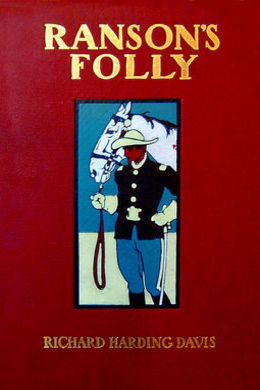
-
EPUB 233 KB
-
Kindle 317 KB
-
Support epubBooks by making a small $2.99 PayPal donation purchase.
Description
Ranson’s Folly is about the audacious, dare-devil exploits of a junior officer in the U.S. Army, whose position and influence secure a lieutenancy in a Western post. The monotony of the life and its regularity finally drive him into the folly of donning the disguise of a band of notorious highwaymen, and holding up the public coach. The results of this escapade are almost tragic for the reckless young excitement seeker.
296 pages with a reading time of ~4.50 hours (74030 words), and first published in 1902. This DRM-Free edition published by epubBooks, 2011.
Community Reviews
There are currently no other reviews for this book.
Excerpt
The junior officers of Fort Crockett had organized a mess at the post–trader’s. “And a mess it certainly is,” said Lieutenant Ranson. The dining–table stood between hogsheads of molasses and a blazing log–fire, the counter of the store was their buffet, a pool–table with a cloth, blotted like a map of the Great Lakes, their sideboard, and Indian Pete acted as butler. But none of these things counted against the great fact that each evening Mary Cahill, the daughter of the post–trader, presided over the evening meal, and turned it into a banquet. From her high chair behind the counter, with the cash–register on her one side and the weighing–scales on the other, she gave her little Senate laws, and smiled upon each and all with the kind impartiality of a comrade. At least, at one time she had been impartial. But of late she smiled upon all save Lieutenant Ranson. When he talked, she now looked at the blazing log–fire, and her cheeks glowed and her eyes seemed to reflect the lifting flame. For five years, ever since her father brought her from the convent at St. Louis, Mary Cahill had watched officers come and officers go. Her knowledge concerning them, and their public and private affairs, was vast and miscellaneous. She was acquainted with the traditions of every regiment, with its war record, with its peace–time politics, its nicknames, its scandals, even with the earnings of each company–canteen. At Fort Crockett, which lay under her immediate observation, she knew more of what was going forward than did the regimental adjutant, more even than did the colonel’s wife. If Trumpeter Tyler flatted on church call, if Mrs. Stickney applied to the quartermaster for three feet of stovepipe, if Lieutenant Curtis were granted two days’ leave for quail–shooting, Mary Cahill knew it; and if Mrs. “Captain” Stairs obtained the post–ambulance for a drive to Kiowa City, when Mrs. “Captain” Ross wanted it for a picnic, she knew what words passed between those ladies, and which of the two wept. She knew all of these things, for each evening they were retailed to her by her “boarders.” Her boarders were very loyal to Mary Cahill. Her position was a difficult one, and had it not been that the boy–officers were so understanding, it would have been much more difficult. For the life of a regimental post is as circumscribed as the life on a ship–of–war, and it would no more be possible for the ship’s barber to rub shoulders with the admiral’s epaulets than that a post–trader’s child should visit the ladies on the “line,” or that the wives of the enlisted men should dine with the young girl from whom they “took in” washing. So, between the upper and the nether grindstones, Mary Cahill was left without the society of her own sex, and was of necessity forced to content herself with the society of the officers. And the officers played fair. Loyalty to Mary Cahill was a tradition at Fort Crockett, which it was the duty of each succeeding regiment to sustain. Moreover, her father, a dark, sinister man, alive only to money–making, was known to handle a revolver with the alertness of a town–marshal. Since the day she left the convent Mary Cahill had held but two affections: one for this grim, taciturn parent, who brooded over her as jealously as a lover, and the other for the entire United States Army. The Army returned her affection without the jealousy of the father, and with much more than his effusiveness. But when Lieutenant Ranson arrived from the Philippines, the affections of Mary Cahill became less generously distributed, and her heart fluttered hourly between trouble and joy. There were two rooms on the first floor of the post–trader’s—this big one, which only officers and their women–folk might enter, and the other, the exchange of the enlisted men. The two were separated by a partition of logs and hung with shelves on which were displayed calicoes, tinned meats, and patent medicines. A door, cut in one end of the partition, with buffalo–robes for portieres, permitted Cahill to pass from behind the counter of one store to behind the counter of the other. On one side Mary Cahill served the Colonel’s wife with many yards of silk ribbons to be converted into german favors, on the other her father weighed out bears’ claws (manufactured in Hartford, Conn., from turkey–bones) to make a necklace for Red Wing, the squaw of the Arrephao chieftain. He waited upon everyone with gravity, and in obstinate silence. No one had ever seen Cahill smile. He himself occasionally joked with others in a grim and embarrassed manner. But no one had ever joked with him. It was reported that he came from New York, where, it was whispered, he had once kept bar on the Bowery for McTurk.
